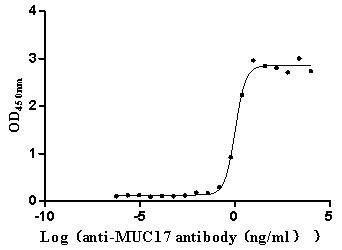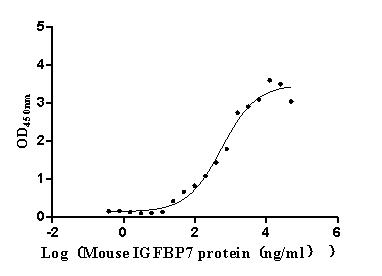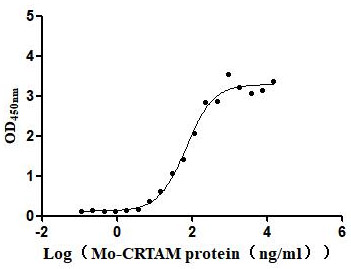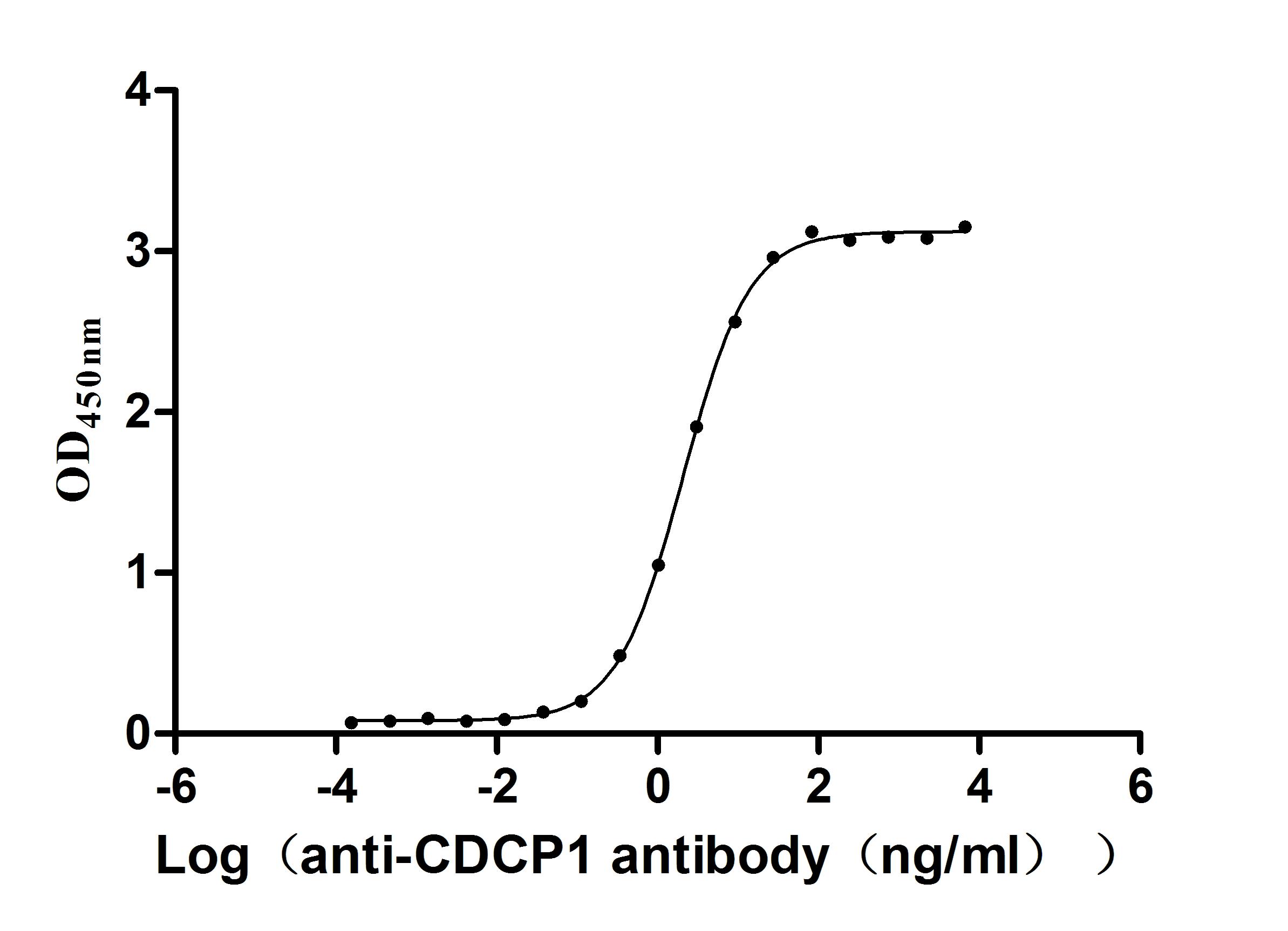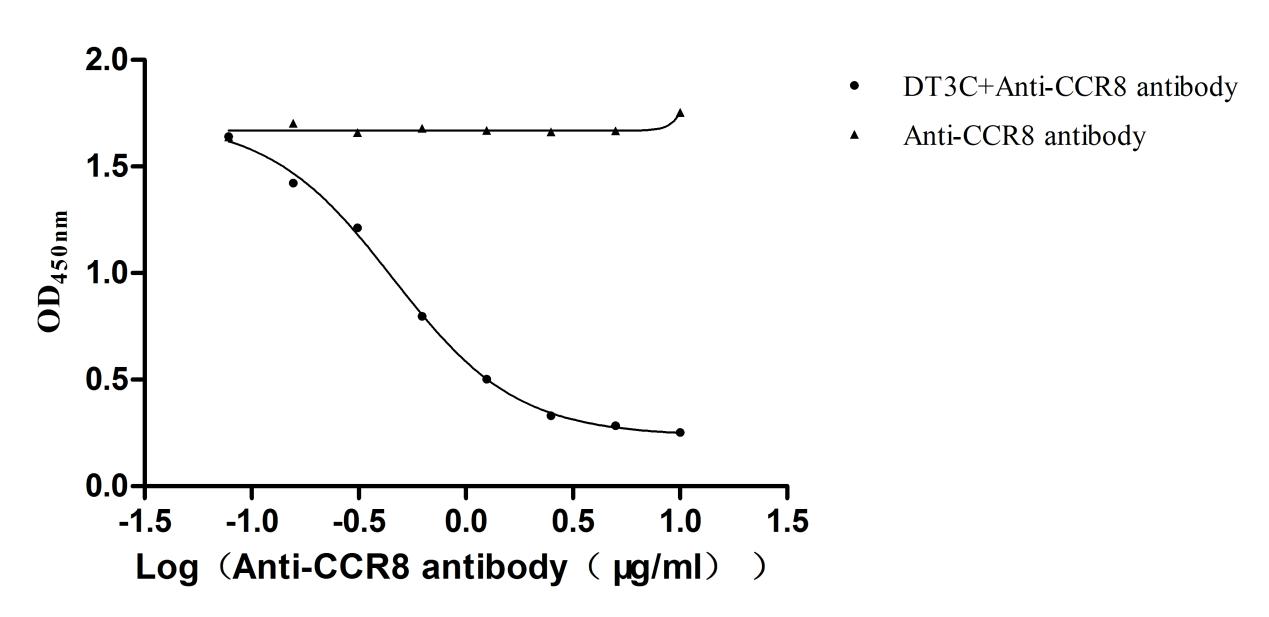Recombinant Human Poly [ADP-ribose] polymerase 2 (PARP2)
-
货号:CSB-YP866224HU
-
规格:
-
来源:Yeast
-
其他:
-
货号:CSB-EP866224HU-B
-
规格:
-
来源:E.coli
-
共轭:Avi-tag Biotinylated
E. coli biotin ligase (BirA) is highly specific in covalently attaching biotin to the 15 amino acid AviTag peptide. This recombinant protein was biotinylated in vivo by AviTag-BirA technology, which method is BriA catalyzes amide linkage between the biotin and the specific lysine of the AviTag.
-
其他:
-
货号:CSB-MP866224HU
-
规格:
-
来源:Mammalian cell
-
其他:
产品详情
-
纯度:>85% (SDS-PAGE)
-
基因名:
-
Uniprot No.:
-
别名:ADP ribosyltransferase like 2; ADP-ribosyltransferase diphtheria toxin-like 2; ADPRT 2; ADPRT-2; ADPRT2; ADPRTL 2; ADPRTL 3; ADPRTL2; ADPRTL3; ARTD2; hPARP 2; hPARP-2; hPARP2; NAD(+) ADP ribosyltransferase 2; NAD(+) ADP-ribosyltransferase 2; pADPRT 2; pADPRT-2; pADPRT2; PARP 2; PARP-2; PARP2; PARP2_HUMAN; Poly (ADP ribose) polymerase family member 2; Poly (ADP ribosyl) transferase like 2; poly (ADP-ribose) polymerase 2; Poly [ADP ribose] synthetase 2; Poly [ADP-ribose] polymerase 2; Poly(ADP ribose) synthetase; Poly[ADP-ribose] synthase 2
-
种属:Homo sapiens (Human)
-
蛋白长度:full length protein
-
表达区域:1-583
-
氨基酸序列MAARRRRSTG GGRARALNES KRVNNGNTAP EDSSPAKKTR RCQRQESKKM PVAGGKANKD RTEDKQDGMP GRSWASKRVS ESVKALLLKG KAPVDPECTA KVGKAHVYCE GNDVYDVMLN QTNLQFNNNK YYLIQLLEDD AQRNFSVWMR WGRVGKMGQH SLVACSGNLN KAKEIFQKKF LDKTKNNWED REKFEKVPGK YDMLQMDYAT NTQDEEETKK EESLKSPLKP ESQLDLRVQE LIKLICNVQA MEEMMMEMKY NTKKAPLGKL TVAQIKAGYQ SLKKIEDCIR AGQHGRALME ACNEFYTRIP HDFGLRTPPL IRTQKELSEK IQLLEALGDI EIAIKLVKTE LQSPEHPLDQ HYRNLHCALR PLDHESYEFK VISQYLQSTH APTHSDYTMT LLDLFEVEKD GEKEAFREDL HNRMLLWHGS RMSNWVGILS HGLRIAPPEA PITGYMFGKG IYFADMSSKS ANYCFASRLK NTGLLLLSEV ALGQCNELLE ANPKAEGLLQ GKHSTKGLGK MAPSSAHFVT LNGSTVPLGP ASDTGILNPD GYTLNYNEYI VYNPNQVRMR YLLKVQFNFL QLW
-
蛋白标签:Tag type will be determined during the manufacturing process.
The tag type will be determined during production process. If you have specified tag type, please tell us and we will develop the specified tag preferentially. -
产品提供形式:Lyophilized powder
Note: We will preferentially ship the format that we have in stock, however, if you have any special requirement for the format, please remark your requirement when placing the order, we will prepare according to your demand. -
复溶:We recommend that this vial be briefly centrifuged prior to opening to bring the contents to the bottom. Please reconstitute protein in deionized sterile water to a concentration of 0.1-1.0 mg/mL.We recommend to add 5-50% of glycerol (final concentration) and aliquot for long-term storage at -20℃/-80℃. Our default final concentration of glycerol is 50%. Customers could use it as reference.
-
储存条件:Store at -20°C/-80°C upon receipt, aliquoting is necessary for mutiple use. Avoid repeated freeze-thaw cycles.
-
保质期:The shelf life is related to many factors, storage state, buffer ingredients, storage temperature and the stability of the protein itself.
Generally, the shelf life of liquid form is 6 months at -20°C/-80°C. The shelf life of lyophilized form is 12 months at -20°C/-80°C. -
货期:Delivery time may differ from different purchasing way or location, please kindly consult your local distributors for specific delivery time.Note: All of our proteins are default shipped with normal blue ice packs, if you request to ship with dry ice, please communicate with us in advance and extra fees will be charged.
-
注意事项:Repeated freezing and thawing is not recommended. Store working aliquots at 4°C for up to one week.
-
Datasheet :Please contact us to get it.
相关产品
靶点详情
-
功能:Poly-ADP-ribosyltransferase that mediates poly-ADP-ribosylation of proteins and plays a key role in DNA repair. Mediates glutamate, aspartate or serine ADP-ribosylation of proteins: the ADP-D-ribosyl group of NAD(+) is transferred to the acceptor carboxyl group of target residues and further ADP-ribosyl groups are transferred to the 2'-position of the terminal adenosine moiety, building up a polymer with an average chain length of 20-30 units. Serine ADP-ribosylation of proteins constitutes the primary form of ADP-ribosylation of proteins in response to DNA damage. Mediates glutamate and aspartate ADP-ribosylation of target proteins in absence of HPF1. Following interaction with HPF1, catalyzes serine ADP-ribosylation of target proteins; HPF1 conferring serine specificity by completing the PARP2 active site. PARP2 initiates the repair of double-strand DNA breaks: recognizes and binds DNA breaks within chromatin and recruits HPF1, licensing serine ADP-ribosylation of target proteins, such as histones, thereby promoting decompaction of chromatin and the recruitment of repair factors leading to the reparation of DNA strand breaks. In addition to proteins, also able to ADP-ribosylate DNA: preferentially acts on 5'-terminal phosphates at DNA strand breaks termini in nicked duplex.
-
基因功能参考文献:
- PARP2 is preferentially activated by poly(ADP-ribose) (PAR) and subsequently catalyzes branched PAR chain synthesis. PMID: 30104678
- data further suggest that ARTD2 would function in double strand break repair as a dimeric module, while in single strand break repair it would function as a monomer. PMID: 27708353
- Report a requirement for PARP2 in stabilizing replication forks that encounter base excision repair (BER) intermediates through Fbh1-dependent regulation of Rad51. Whereas PARP2 is dispensable for tolerance of cells to single stranded breaks or homologous recombination dysfunction, it is redundant with PARP1 in BER. PMID: 29467415
- PARP2 specifically limits the accumulation of the resection barrier factor 53BP1 at DNA damage sites, allowing efficient CtIP-dependent DNA end-resection PMID: 29036662
- either PARP1 or PARP2 are sufficient for near-normal XRCC1 recruitment at oxidative single-strand breaks PMID: 27965414
- Studies indicate that poly(ADP-ribose) polymerase 2 (PARP2) is involved in the differentiation of several cell types, including erythrocytes, T cells and adipocytes. PMID: 27087568
- Findings indicate that Increased poly(ADP-ribose) polymerase-2 (PARP-2) expression and loss of micrRNA miR-149 expression are involved in the pathogenesis of hepatocellular carcinomas (HCC) and are poor prognosis factors in patients with HCC. PMID: 27300349
- Data show that E7449 represents a dual Poly(ADP-ribose) Polymerase 1/2 and tankyrase 1/2 inhibitor which has the advantage of targeting Wnt/beta-catenin signaling addicted tumors. PMID: 26513298
- The initial affinity between the PARP1, PARP2 and the DNA damaged site appears to influence both the size of the Poly(ADP-Ribose) synthesized and the time of residence of PARylated PARP1 and PARP2 on DNA damages. PMID: 26673720
- Our data suggest for the first time that a SNP in PARP2, rs878156, may together with other genetic variants modulate cancer specific survival in breast cancer patients depending on chemotherapy PMID: 26674097
- Our study differentiates the functions of PARP-2 domains from those of PARP-1, the other major DDR-PARP, and highlights the specialization of the multi-domain architectures of DDR-PARPs. PMID: 26704974
- Interaction of PARP-2 with AP site containing DNA PMID: 25724268
- Identification of ADP-ribosylation sites in PARP2 and the determination of the extent ofpoly(ADP-ribosyl)ated residues in this protein was performed. PMID: 25800440
- Nuclear Smad function is negatively regulated by PARP-1 that is assisted by PARP-2 and positively regulated by PARG during the course of TGFB signaling. PMID: 25133494
- the depletion of PARP-2 leads to lower HDL levels which represent a risk factor to cardiovascular diseases. PMID: 24365238
- these findings propose a novel mechanism of PARP-2 in transcriptional regulation involving specific protein-protein interactions and highlight the importance of PARP-2 in the regulation of cell cycle progression. PMID: 23291187
- PARP-1 (but not PARP-2) poly(ADP) ribosylates Snail1, both in vivo and in vitro, and interacts with Snail1, an association that is sensitive to PARP inhibitors. PMID: 21577210
- In complex with its inhibitor, the crystal structure of PARP2 alpha-helix 5 that contains glutamate residue Glu335 is closer to the active site than in both PARP1 and PARP3 and suggests a mechanism for a weak bias toward PARP2. PMID: 20092359
- The PARP-2 gene might be associated with azoospermia by meiotic arrest PMID: 19806447
- PARP-1 and PARP-2 act as positive regulators of genomic stability in eukaryotic cells by counteracting topoisomerase I-induced DNA damage PMID: 14699148
- PARP-2 and PARP-1 interact with TTF-1 and regulate the expression of surfactant protein B, a protein required for lung function PMID: 16461352
- cells from old subjects show a constitutive expression level of both parp 1 and parp 2 genes reduced by a half PMID: 17518695
- Determination of Poly (ADP-ribose) polymerase (PARP) homologues in human ejaculated sperm and its correlation with sperm maturation. PMID: 18339380
- PARP-1-but not PARP-2-is required for proper expression of major genes involved in regulation of apoptosis PMID: 18587655
- Results provide strong evidence that lysine 36 of PARP-2 is a critical residue for proper nuclear targeting of PARP-2 and consequently for the execution of its biological functions. PMID: 18644123
- The histone subcode: poly(ADP-ribose) polymerase-1 (Parp-1) and Parp-2 control cell differentiation by regulating the transcriptional intermediary factor TIF1beta and the heterochromatin protein HP1alpha PMID: 18676401
显示更多
收起更多
-
亚细胞定位:Nucleus. Chromosome.
-
组织特异性:Widely expressed, mainly in actively dividing tissues. The highest levels are in the brain, heart, pancreas, skeletal muscle and testis; also detected in kidney, liver, lung, placenta, ovary and spleen; levels are low in leukocytes, colon, small intestine
-
数据库链接:
HGNC: 272
OMIM: 607725
KEGG: hsa:10038
STRING: 9606.ENSP00000250416
UniGene: Hs.409412
Most popular with customers
-
Recombinant Macaca fascicularis Claudin (CLDN18)-VLPs (Active)
Express system: Mammalian cell
Species: Macaca fascicularis (Crab-eating macaque) (Cynomolgus monkey)
-
Recombinant Human Complement component C1q receptor (CD93), partial (Active)
Express system: Mammalian cell
Species: Homo sapiens (Human)
-
Recombinant Human Interleukin-17A (IL17A) (T26A) (Active)
Express system: Baculovirus
Species: Homo sapiens (Human)
-
Recombinant Human Mucin-17 (MUC17), partial (Active)
Express system: Mammalian cell
Species: Homo sapiens (Human)
-
Recombinant Mouse Complement component C1q receptor (Cd93), partial (Active)
Express system: Mammalian cell
Species: Mus musculus (Mouse)
-
Recombinant Mouse Cell adhesion molecule 1 (Cadm1), partial (Active)
Express system: Mammalian cell
Species: Mus musculus (Mouse)
-
Recombinant Macaca fascicularis CUB domain containing protein 1 (CDCP1), partial (Active)
Express system: Mammalian cell
Species: Macaca fascicularis (Crab-eating macaque) (Cynomolgus monkey)
-
Recombinant DT3C (Diphtheria toxin & spg 3C domain) for Antibody Internalization Assay (Active)
Express system: E.coli
Species: N/A


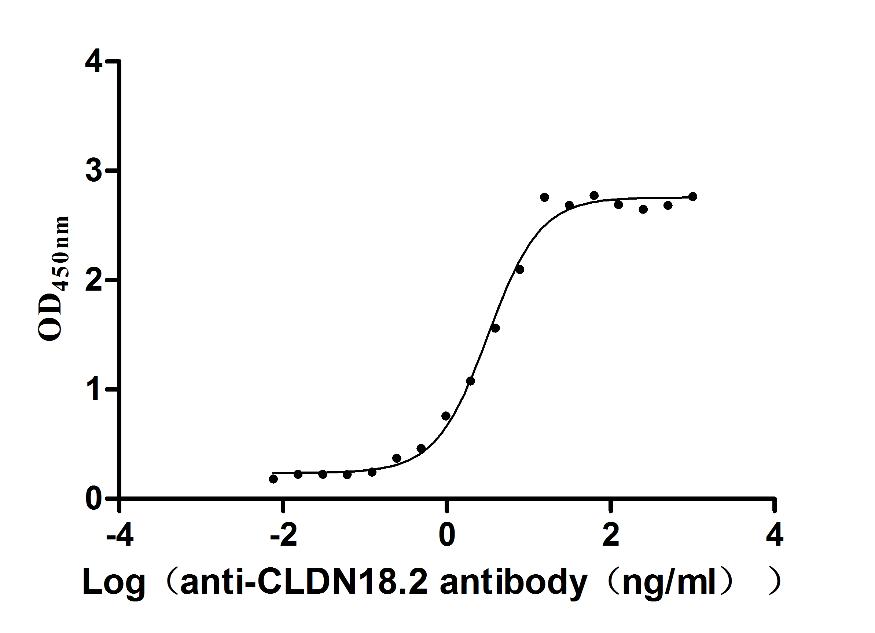
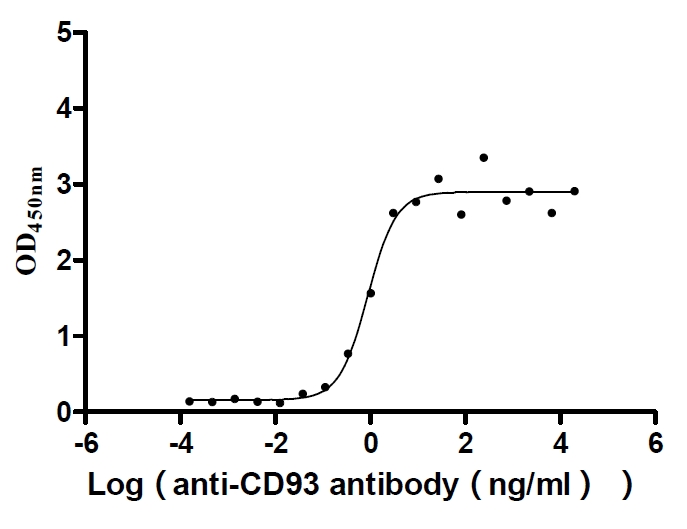
-AC1.jpg)
